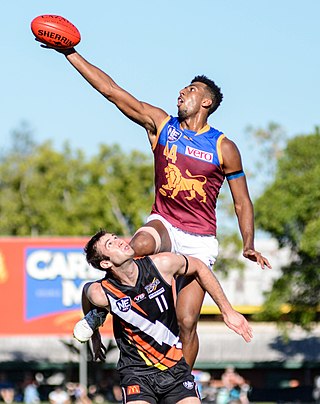
Australian rules football, also called Australian football or Aussie rules, or more simply football or footy, is a contact sport played between two teams of 18 players on an oval field, often a modified cricket ground. Points are scored by kicking the oval ball between the central goal posts, or between a central and outer post.
A State of Origin competition is a type of sporting event between players representing their state or territory. State of Origin began in Australian rules football on 8 October 1977 between Western Australia (WA) and Victoria, at Subiaco Oval in Perth, the initial brainchild of Leon Larkin. The selection criteria for Australian football have varied, but they are generally applied to players who have played most of their juniors games in a particular state or territory, hence the name "State of Origin". In Rugby League the criteria are different, where players are selected for where they either first played senior Rugby League or where they played in the majority of senior competitions. The annual Rugby League State of Origin series is one of Australia's most popular sporting events. The name is also used in Australia for small sporting events which generally involve domestic representative teams.
The Simpson Medal is an individual prize awarded for Australian rules football in Western Australia. The medal has been donated by Dr Fred Simpson and family since 1945.
Dale Weightman is a former Australian rules footballer who played for the Richmond Football Club in the Australian Football League (AFL).

Football in Australia refers to numerous codes which each have major shares of the mainstream sports market, media, broadcasting, professional athletes, financial performance and grassroots participation: Australian rules football, rugby league, rugby union and soccer. There are four pre-eminent professional football competitions played in Australia: the Australian Football League, the National Rugby League, Super Rugby and the A-League (soccer). Rugby League is the most watched sport in Australia based on television viewership, however, Australian football attracts larger live attendences. In the states of New South Wales and Queensland, rugby football is overall the most watched and receives the most media coverage, especially the Rugby League State of Origin contested between the two states referred to as "Australian sport's greatest rivalry". In recent times, there has been an increase in popularity in Australian football and corresponding decrease in popularity of Rugby union in New South Wales and Queensland. Soccer, while extending its lead in participation rate, particularly in the large cities, and improving its performance at the FIFA World Cup and at the FIFA Women's World Cup, continues to attract the overall lowest attendance, as well as media and public interest, of the four codes.
The State of Origin series is an annual best-of-three rugby league series between two Australian state representative sides, the New South Wales Blues and the Queensland Maroons.
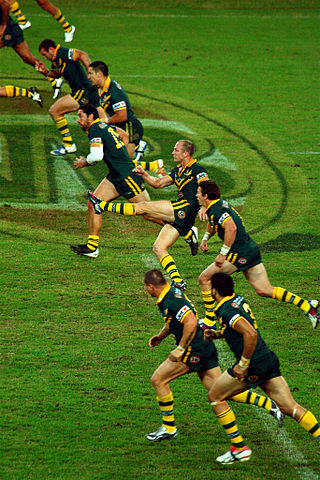
Rugby league in Australia has been one of Australia's most popular sports since it started being played there in 1908. It is the dominant winter football code in the states of New South Wales and Queensland. In 2022, it was the most watched sport on Australian television with an aggregate audience of 137.3 million viewers. The premier club competition is the National Rugby League (NRL), which features ten teams from New South Wales, four teams from Queensland, and one team each from Victoria, the Australian Capital Territory and New Zealand. The premier representative competition is the annual Rugby league State of Origin featuring two sides, the New South Wales Blues and the Queensland Maroons is often referred to as "Australian sport's greatest rivalry", it is one of Australia's premier sporting events, attracting huge interest and television audiences.

Representative matches in Australian rules football are matches between representative teams played under the Australian rules, most notably of the colonies and later Australian states and territories that have been held since 1879. For most of the 20th century, the absence of a national club competition in Australia and international matches meant that intercolonial and later interstate matches were regarded with great importance.
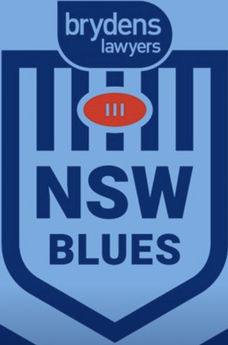
The New South Wales rugby league team has represented the Australian state of New South Wales in rugby league football since the sport's beginnings there in 1907. Also known as the Blues due to their sky blue jerseys, the team competes in the annual State of Origin series against Queensland. For 2024, the team was coached by Michael Maguire and captained by Jake Trbojevic.

Soccer, also known as football, is the most played outdoor club sport in Australia, and ranked in the top ten for television audience as of 2015. The national governing body of the sport is Football Australia (FA), which until 2019, organised the A-League Men, A-League Women, and still organises the Australia Cup, as well as the men's and women's national teams, while foreign leagues such as the Premier League, the Championship and the Women's Super League also being popular. The FA comprises nine state and territory member federations, which oversee the sport within their respective region.

The Australian Football League (AFL) is the pre-eminent professional competition of Australian rules football. It was originally named the Victorian Football League (VFL) and was founded in 1896 as a breakaway competition from the Victorian Football Association (VFA), with its inaugural season in 1897. It changed its name to Australian Football League in 1990 after expanding its competition to other Australian states in the 1980s. The AFL publishes its Laws of Australian football, which are used, with variations, by other Australian rules football organisations.
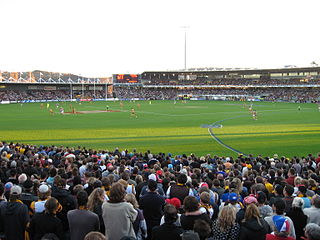
Australian rules football has been played in Tasmania since the late 1860s. It draws the largest audience for any football code in the state. A 2018 study of internet traffic showed that 79% of Tasmanians are interested in Australian rules football, the highest rate in the country.
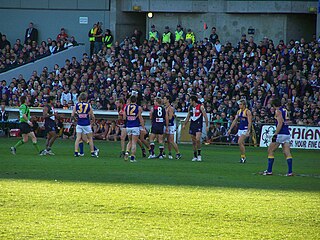
Australian rules football is the most popular sport in Western Australia (WA). There are 29 regional club competitions, the highest profile of which is the semi-professional West Australian Football League. It is governed by the West Australian Football Commission (WAFC). With more than 95,000 registered adult players, it has the second largest of any jurisdiction, accounting for almost a fifth of players nationally and growing faster than any other state.

Australian rules football is the most watched and attended sport and the second most participated code of football in Australia. Since originating in Victoria in 1858 and spreading elsewhere from 1866, it has been played continuously in every Australian state since 1903 plus the two major territories since 1916.
Michael William Cronin OAM is an Australian former professional rugby league footballer and coach. He was a goal-kicking centre for the Australian national team and a stalwart for the Parramatta Eels club. He played in 22 Tests and 11 World Cup matches between 1973 and 1982. Cronin retired as the NSWRL Premiership's and the Australian Kangaroos' all-time highest point-scorer and has since been named amongst the nation's finest footballers of the 20th century.
Michael Clifford Fitzpatrick is an Australian businessman, sporting administrator and former professional Australian rules football player. He was chairman of the AFL Commission from 2007 to 2017.

The Victoria Australian rules football team, known colloquially as the Big V, is the state representative side of Victoria, Australia, in the sport of Australian rules football.

The Western Australia Australian rules football team is the state representative side of Western Australia in the sport of Australian rules football.

The South Australia state football team is the representative side of South Australia in the sport of Australian rules football.
Australia is home to four professional football codes. This is a comprehensive list of 'crowd figures for Australian football codes in 2012. It includes several different competitions and matches from Australian rules football, Association football (Soccer), rugby league and rugby union and International rules football which is hybrid game played between Australian & Ireland which takes aspect from Australian rules football & Gaelic football. Melbourne, Sydney and Brisbane have teams represented in all four codes. Hobart and Darwin are Australia's only capital cities without a professional football team though they are home to professional games of Australian Football.












